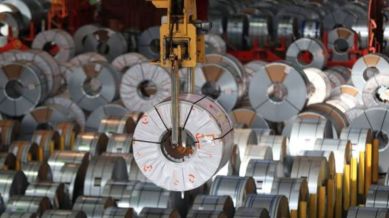The Embassy of Japan in India has raised concerns with two central ministries — the Ministry of Steel and the Ministry of Commerce and Industry — stating that Japanese steel consignments are being held up at Indian ports by Customs officials due to the absence of a No Objection Certificate (NOC), documents reviewed by The Indian Express showed.
“I understand that normally, the NOC is granted following Quality Control (QC) Committee meetings, which are typically held twice a month at your ministry. However, since September 2024, these meetings have been suspended, and the NOCs have not been issued,” said Takashi Ariyoshi, Chargé d’Affaires ad interim at the Japanese embassy, in a letter dated October 24.
Ariyoshi said that Japanese companies are incurring “huge detention charges” as shipments remain stuck at ports, disrupting commercial activities. Despite repeated communications to the ministry, no progress has been made, and without action, steel imports from Japan to India will remain suspended, he said.
Indian importers have similarly voiced their concerns, stating that numerous steel containers have been stuck at ports for nearly two months. This development coincides with intensified lobbying by large Indian steel companies, which are pushing for measures to curb surging imports that are affecting their profitability. However, the micro, small and medium enterprises (MSMEs) have opposed restrictions on steel imports, citing the significantly higher cost of domestic steel.
“We have reached out to the Department for Promotion of Industry and Internal Trade (DPIIT) and the Ministry of Steel for relief. However, importers are not receiving NOCs, even for items unavailable in India or not competitively priced domestically,” a trader said, speaking on condition of anonymity.
The trader added, “We are being told that the delay in NOCs is due to a surge in imports. Authorities are pressuring us to purchase steel from Indian manufacturers. While we are open to using domestic products, they need to be available at reasonable prices. Unfortunately, some companies have formed cartels to keep prices high, which is a major challenge for small manufacturers.”
Notably, India’s import in September surged to $60 billion, highest in over a year. Traders have also raised concerns about mounting detention costs and called for consistent policies, as they have already incurred shipping and other expenses. The delays are causing significant losses, particularly for smaller players. Queries sent to the Ministry of Steel did not recieve a response.
Story continues below this ad
The Commerce Ministry, in response to a query, said that the issue is in the domain of the Steel Ministry. Trade experts have said that India’s steel-consuming industries are facing a crisis due to prolonged port delays and bureaucratic hurdles.
The government’s Steel Import Monitoring System (SIMS) mandates detailed declarations before goods arrive, while Quality Control Orders (QCOs) require specific steel products to be registered with the Bureau of Indian Standards (BIS), explained Ajay Srivastava, founder of the think tank Global Trade Research Initiative (GTRI).
“However, Customs authorities have extended these requirements indiscriminately, demanding BIS NOCs even for items outside the scope of QCOs. This has led to confusion, delays, and increased costs, as BIS rarely issues NOCs promptly. Additionally, technical issues with the Steel Ministry’s SIMS registration system have further delayed clearances,” GTRI stated.
The think tank added that while policies aimed at protecting domestic steelmakers, such as import restrictions and quality controls, are well-intentioned, they have placed a heavy burden on industries reliant on imported steel.
Story continues below this ad
India’s steel trade data for FY24 reflects a trade deficit in core steel but a surplus in steel products. Core steel exports (HS 72) totalled $11.9 billion, while imports surged to $18.6 billion, resulting in a significant trade deficit.
Conversely, steel product exports (HS 73) reached $9.9 billion, surpassing imports of $5.1 billion. Overall, India exported $21.8 billion worth of steel and steel products, while imports stood at $23.7 billion, underscoring challenges in the core steel segment. Core steel exports declined slightly from $12.1 billion in FY21 to $11.9 billion in FY24, highlighting difficulties in competing with cheaper imports and limited domestic production of high-end steel.
On the other hand, imports of core steel more than doubled from $8.3 billion in FY21 to $18.6 billion in FY24, driven by demand for items like flat-rolled and specialty steels (43.4 per cent) used in advanced industries such as defence and aerospace. Other major import categories included steel scrap (34 per cent), steel ingots (7.3 per cent), stainless steel ingots (7.6 per cent), and ferroalloys (5.7 per cent), the GTRI report stated.
